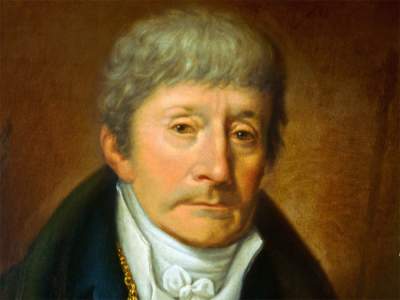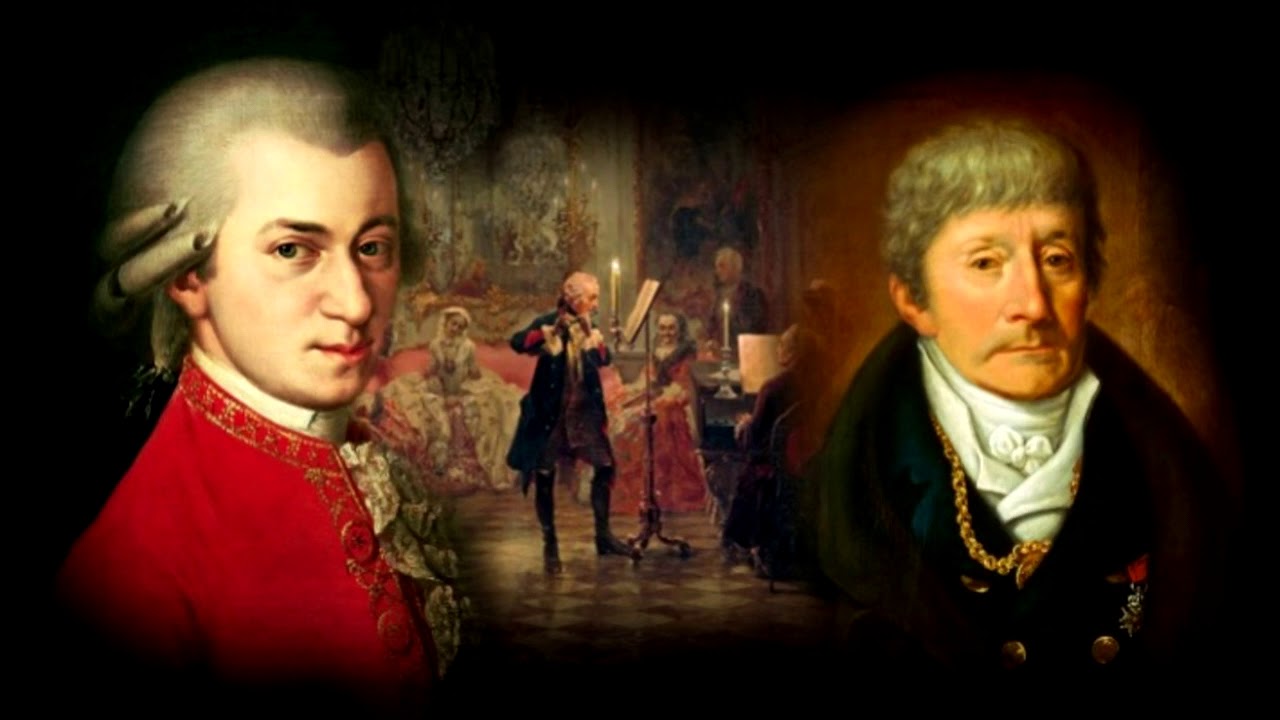Tragedy Mozart and Salieri: summary and characteristics of the main characters
In the short play Pushkin "Mozart and Salieri", the poet connects the historical myth about the rivalry of the two great Austrian composers with the philosophical understanding of burning passions pushing to betrayal and murder.
In contact with
Historical persons in tragedy
Poetic tragedy Alexander Sergeevich Pushkin posted in 1830 In the romantic period of the Boldin Autumn. At this time, the great Russian poet composed four literary works of the cycle "Little tragedies", one of which was the play "Mozart and Salieri" with the initial speaker name "envy".
The classic Shakespeare Drama, in which tragic human passions raise, is very short, concise, and consists of two short-term actions. The heroes of this dramatic work are real historical persons - these are two famous and successful Austrian composers and musicians - Wolfgang Amadeus Mozart and Antonio Salieri.
History of creation The poetic work is such: the legendary myth of the treacherous elimination of the opponent through poison poisoning was adopted by Pushkin as the basis of the dramatic plot.
The main character of the Austrian and Italian composer Salieri declares:
"And now - I myself say - I now
Envious. I envy; deep,
Painfully envy ... "
An experienced and active composer considers young, talented and frivolous Mozart of the Balove of Fate, unworthy of his own genius.
Attention!Salieri justifies his sinful act that genius folfgang amatery is useless.
Antonio considers the daily writing work of a creative musician painstaking and calculating, subject to the laws of harmony: "The craft I put fit art."
Brief biography Salieri
 Italian and Austrian composer, conductor and teacher, Antonio Salieri was one of the most successful and recognizedmusical authors of their time. He was born in 1750 in the vicinity of Verona in the family of a rich merchant. The gifted young man studied music in Venice for some time, then in 1766 Anton Salieri (the German name of the name) moved to Vienna - the capital of Austria.
Italian and Austrian composer, conductor and teacher, Antonio Salieri was one of the most successful and recognizedmusical authors of their time. He was born in 1750 in the vicinity of Verona in the family of a rich merchant. The gifted young man studied music in Venice for some time, then in 1766 Anton Salieri (the German name of the name) moved to Vienna - the capital of Austria.
After publishing the Opera, "Armid" became a pretty famous composer, the author of many vocal and instrumental works. During his creative period, more than forty operas wrote and had a great success not only in Austria, but also in France.
Since 1774, the musician was appointed a court composer, and from 1778 to 1824 served as the royal dropletaster, possessing excellent diplomatic qualities and musical talent.
Professional career The composer was extremely successful - he held the highest European post in a professional environment. The composer survived three emperors, invariably participating in all significant activities of the public and musical sphere of Europe. Was a secured person.
Pedagogical activity
Pupils of the Great Teacor's teacher were:
- Ludwig van Beethoven;
- Franz Peter Schubert;
- Ferenc Sheet;
- Karl Mobile;
- Yang Nepomuk Hummel;
- Luigi Kerubini.
Important! A musician died in 1825 in Vienna, making a magnificent career not only as a composer and conductor, but also as a teacher and a public figure. Maestro fully realized in the profession and was successful in art.
Divine gift and traditions
Summary The plays includes the arrogant Salier's attitude towards "non-elite" musicians. Preparing common, the court chapelster considers art and musical talent by the lot of selected professionals who create their masterpieces on the strict rules of the mathematical tradition.
In the environment, such a musician feels confidently and arrogant, as it considers this thorny path the only possible in art.
With the advent of young Mozart in the professional composer environment, Antonio Salieri admires his genius and "Divine Spark", melting in his light and free music.

Inevitable tragedy
The plot of the play is based on conflict of worship and envy to the talent of a young friend. Salieri exclaims: "You, Mozart, not clear yourself." In this exclamation, the delight and adolescence in front of the genius, carelessness and the life of the colleague are expressed at the same time. envious feelingpushes the maestro to the crime. The brutal tragedy is deployed in front of the reader. Emotional monologue of indignant Antonio, who justifies himself, as the Savior of the composer elite, Pttit with paints and mental experiences. A brief speech of Pushkin Mozart in the text of the play is uncertain and limited - he says fragments of phrases. Rastery and depressed.
Contliminate characters
Piece is quite short and consists of two scenes. The main characters take part in theatrical action:
- Mozart;
- Salieri;
- Old man - violinist (street musician).
The legendary image of Wolfgang Amadeus Mozart is described by Pushkin, like a light genius, "writing music, like birds sing." Young talent seems to be gifted and a serene genius that does not know the flour of creativity. Salieri, this gentle image sarcastically calls the "idle walk", which is not aware of his divine gift and calls his own musical ideas by a bellish.
Conflict Talent
 The problems of negative relations are intensified by the "omnivorousness" of Mozart, who is pleased with the execution of its author's melody in an inept outdoor musician. His amazing dilettanic sound, more like a creaking than a cheerful music.
The problems of negative relations are intensified by the "omnivorousness" of Mozart, who is pleased with the execution of its author's melody in an inept outdoor musician. His amazing dilettanic sound, more like a creaking than a cheerful music.
Antonio is indignant and dissatisfied with the fact that blind violinist is playing Mozart melody, and not its copyright essay. With this ridiculous scene and tragic outcome developsplays - Maestro decides to save the composer shop by deliverance from the careless "shepherd".
Justice and black envy
In accordance with the artistic purpose Pushkin's plays, Maestro Antonio embodies the rebellious spirit protesting against the injustice of earthly and heavenly. He is being tormented by doubts and the black envy is that he is not awarded in the genius - the humble working, but the "fellow idiot" is unworthy.
Externally, the relationship between the cheerful and so-cold Wolfgang and the double antonio look like friendly. In theory of Pushkin - Mozart, trusting, is simple, and does not suspect for his inexperience of danger, confirming the genre of the play.
Maestro reached its professional, social heights and recognition by long dedicated labor and personal discipline. Entering the conflict with a musician supernatural giftedness, Salieri descends to tragic intrigue.
The poisoning scene is accompanied by the dialogue of the main characters, where Salieri tells Wolfgang Amadeu that who who — it was poisoned by his friend Boualersche. And at that moment, the brilliant Mozart pronounces the phrase, which became "Wiltha": "Genius and the villain of two things are incompatible."
An experienced sophisticated composer, accustomed to achieving musical art heights with creative hardworking, challenged that the young, and lifeless Mozart is similar to Paradise Cherubim. An angel-like musician lit up a sinful world with gentle sounds of his divine works. Therefore, the cunning hero decides to "return" this angel into his wonderful paradise world.
According to the plot of the poetic work of Alexander Pushkin Salieri poisoned Mozart, By inviting him to dine in the Tavern "Golden Lion".
Calculable musician pumped poison He was stored for eighteen years old, in the bowl of friendship, approaching the tragic end.
Fatal foresight and tribute to art
In the philosophical understanding, Alexander Sergeevich Pushkin considers deep universal problems:
- responsibility;
- man morality art;
- serving art.
What is more moral - talent or art? The idea of \u200b\u200buniversal justice turns into personal envy and black villain.
Crime in Golden Lion
In the second and last scene of the play, the action takes place in a separate restaurant of the Golden Lion, where Salieri and Mozart are located. The young composer plays separate excerpts from his new work on the piano. The composer who is constantly demanding money, adopted an order for the composition of the requiem (a large musical work for choir and orchestra on the clock service). Young genius is in the oppressed state and confusion.
Requiem ordered unknown man in blackwho paid well the composer for this complex mourning essay. Mozart began to execute, but in the last three weeks he is given to the idea that the "black man" relentlessly pursues him. The musician drinks wine poisoned with his friend and removes, feeling the approach of death.
Important! It seems that the figure of the genius of Pushkin is unknown in black in the artistic plan serves as an embodiment of the hostile world. Such a terrifying association inevitably arises throughout the final scene of this legendary tragic play.
Drama A.S. Pushkin "Mozart and Salieri": a brief analysis, the content of the tragedy
Pushkin Resection A. S. "Mozart and Salieri"
Output
Composing the Requiem for the Found Service for the Dead, Wolfgang Amadeus Missed with a tragic share and obeys Divine Fate. The sad completion of the poetic work is accompanied by cunning tears antonio - tears of executed debt and liberation.
